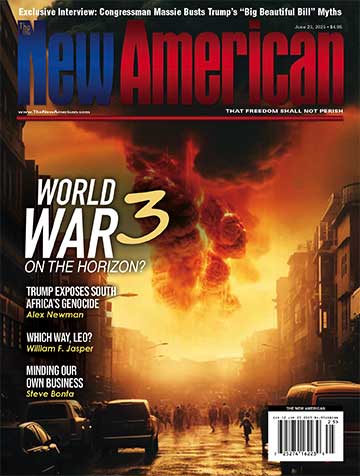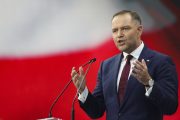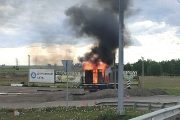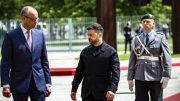
The Polish government is “mentally” preparing its population for the country’s direct involvement in the Ukraine conflict, former U.S. Army officer Stanislav Krapivnik told Russia Today (RT) on March 21. He alleged that recent allegations made by top Polish officials regarding Russia’s purported plans to attack NATO are meant to justify a preemptive military operation.
Over the past several weeks, various senior civilian and military officials from multiple NATO member states cautioned that Moscow could attack the bloc in the coming years. On March 18, the chief of the Polish General Staff, General Wieslaw Kukula, said that “Russia is preparing for a conflict with NATO” in the next decade, elaborating that Moscow “will exploit any opportunity and any emerging weakness that can be operationalized to achieve its own interests.”
As per Krapivnik, such statements form part of a “psy-op operation” by Warsaw designed to “prepare the people for war.” He suggested that most Poles believe such narratives since “Russophobia in Poland is tantamount to a national characteristic,” and predicted that the Polish government would then start promoting a “first strike” to forestall Russian forces from reaching the country’s border.
Krapivnik told RT that, while many NATO countries would like to prevent a direct confrontation with Russia, the bloc would inevitably be dragged into a conflict if more “trigger-happy” nations like Poland, the Czech Republic, and the Baltic states act first.
He noted, however, that some nations — including Hungary, Slovakia, Bulgaria, Greece, and especially the U.S. — would not likely participate in such a face-off.
Regarding Washington’s stance, Krapivnik claimed that the leadership there would have no qualms about “sacrific[ing] the Europeans.”
Russian President Vladimir Putin has repeatedly declared that Moscow has no plans to attack NATO. Addressing his supporters after winning the presidential election, he said “anything is possible in the modern world,” but hardly “anyone is interested” in a full military confrontation.
Speaking to CNBC on March 18, Polish President Andrzej Duda, quoting unspecified German research, claimed that Russia could invade NATO in 2026 or 2027. He called on fellow member states to ramp up their defense spending, with a view to creating “such a deterrent that ensures we are not attacked.”
Similarly, Dutch independent journalist Sonja van den Ende told RT on March 18 that the West wants “a war with Russia” and is actively preparing for this scenario. Van den Ende, who writes for the Tehran Times, Insider Paper.com, and Oneworld.press media outlets, told RT that Western states are the “ones who are aggressive, they are the ones actually preparing themselves to go to war.”
Increasingly aggressive rhetoric from Western officials is evident, the journalist contended, citing ongoing efforts to accumulate ammunition and develop military drones, including long-range ones that could theoretically strike Russian territory. Van den Ende added that European nations are now putting their economies on a war footing.
Based on the Dutch journalist, however, NATO is not yet prepared for a stand-off with Russia, with countries such as Germany facing severe staffing shortages in their military. This problem is proving to be particularly grave, van den Ende claimed, noting that many Europeans are not enticed by the prospect of joining the army, let alone fighting in a war.
In an interview with German press agency dpa on March 20, Radosław Tomasz “Radek” Sikorski, Poland’s foreign minister, stated that the presence of Western forces in Ukraine is now an “open secret.” “As your chancellor [Olaf Scholz] said, there are already some troops from big countries in Ukraine,” he declared.
His statement came less than two weeks after he said the deployment of NATO troops to the country was “not unthinkable,” and that he appreciated French President Emmanuel Macron for not excluding the idea.
Macron had said in late February that he “cannot exclude” the possibility of soldiers from the U.S.-led military bloc being sent to aid Kyiv. The statement sparked a wave of denials from the leaders of NATO member states, who reiterated that they harbored no plans to send combat troops to Ukraine. Macron reinforced his stance this month, saying that Paris recognizes no limits or Russian “red lines” when it comes to backing Kyiv. Europeans “will have to live up to history and the courage that it requires,” the French leader proclaimed.
During a press meeting in February, Scholz justified his rejection of the delivery of Taurus cruise missiles to Ukraine by saying that Berlin would not use soldiers in targeting control, either from Germany or on the ground.
“What the British and the French are doing in terms of target control and accompanying target control cannot be done in Germany,” the chancellor told journalists at the time. His words have been widely regarded as confirming the presence of Western soldiers in Ukraine.
Asked by dpa whether Scholz’ revelation was a problem, Sikorski responded, “In Polish, we have the expression ‘tajemnica poliszynela,’ which describes a secret that everyone knows.”
Sikorski maintained that Warsaw would not deploy ground troops to Ukraine, citing historical reasons. “Ukraine and Poland have been one country for 400 years. This would provide fodder for Russian propaganda. Therefore, we should be the last ones to do so,” he concluded.
Meanwhile, Swedish Foreign Minister Tobias Lennart Billström said on March 21 that his country is determined to confront Russia as part of NATO. Sweden formally joined the U.S.-led military bloc earlier this month.
The top diplomat lauded his country’s future contribution to NATO’s strategy for the Baltic region in an interview with German state broadcaster Deutsche Welle. “It is not Sweden and NATO that constitutes a problem,” he told the broadcaster. “It is Russia that is behaving irresponsibly and recklessly.”
Billström cited instances of Russian behavior that he found “unacceptable,” including Russia’s current military operation in Ukraine. “We are in for a prolonged period of conflict with Russia. It goes for NATO, it goes for the EU. And we have to adapt ourselves accordingly.”
In a recent speech to Russia’s Federal Assembly, Putin commented on the talk of “deploying NATO military contingents to Ukraine” by saying that all previous efforts to conquer Russia have ended in failure, and that “now the consequences for potential invaders would be far more tragic.”




